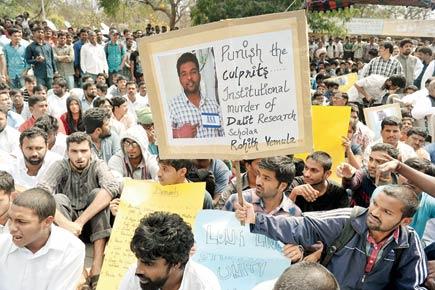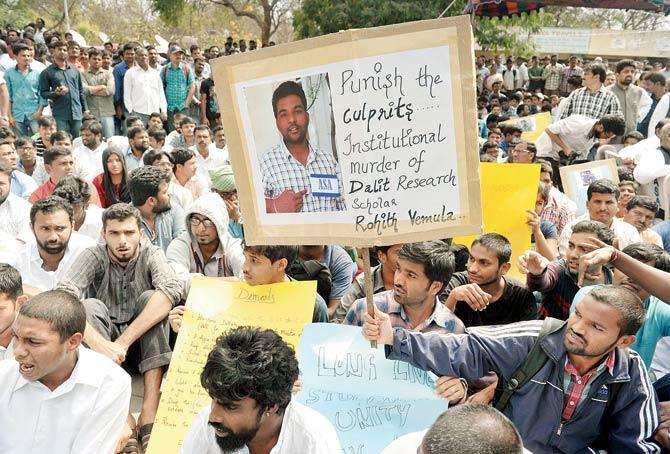What is a nation worth? How we treat our most downtrodden? How compassi- onate we are as a society? How much money we make? How free we are to express ourselves? How we protect our rights? These questions and others like them ought to be a constant

 What is a nation worth? How we treat our most downtrodden? How compassi- onate we are as a society? How much money we make? How free we are to express ourselves? How we protect our rights? These questions and others like them ought to be a constant. Yet one might even argue that we have had to ask them all too often in India in the last 20 months.
What is a nation worth? How we treat our most downtrodden? How compassi- onate we are as a society? How much money we make? How free we are to express ourselves? How we protect our rights? These questions and others like them ought to be a constant. Yet one might even argue that we have had to ask them all too often in India in the last 20 months.

Students protest calling Rohith Vemula’s suicide ‘an institutional murder’, at the Hyderabad Central University yesterday. Pic/AFP
ADVERTISEMENT
There was an enormous backlash from rightwing and pro-government forces when writers, intell- ectuals and creative minds felt that there was a rising intolerance in Indian society, fostered or allowed to thrive by the ruling dispensation. The murder of writers by rightwing elements was the first trigger. Since then, we have been “reassured” that India is “tolerant” and that only anti-nationals would think otherwise.
This week PhD student Rohith Vemula, who was suspended from Hyderabad Central University over a political fight, killed himself, days before his 27th birthday. The charges against Vemula and four other students, all of them Dalits, came after a complaint to the Union HRD ministry, by Union minister and BJP member, Bandaru Dattatreya. These students were part of an organisation called Ambedkar Students’ Association and they had clashed with the Akhil Bhartiya Vidyarthi Parishad, the students’ wing of the larger BJP family. Dattatreya claimed that ASA members had beaten up an ABVP member. The first university probe found no such evidence. Strangely, or perhaps not, that first probe was soon overturned.
The ASA was seen as a “radical” group — it protested against Yakub Memon’s execution in the 1993 Bombay bomb blasts case. It objected to the ABVP’s activities on campus. Its members were outspoken about atrocities against Dalits. And so, Vemula’s suicide is being seen as one more in a long list of discriminatory practices against India’s lower castes, not just in society as a whole, but particularly in India’s institutes for higher education.
Unfortunately, some of India’s temples of education contain examples of some of the worst atrocities against Dalits. Students, far from being aware and high-minded, can be unacceptably biased and cruel. A few years ago the Mumbai campus of IIT was the scene of massive anti-reservation protests by upper caste students even as stories of discrimination against Dalit students emerged.
People argue endlessly about how lower castes need more “education” but seem unaware of how difficult it is for Dalit and lower caste students to continue with higher education. This is even after they have overcome enormous obstacles by getting a toe in the door, as Vemula’s act of desperation demonstrates. The university had withheld his stipend. He was struggling to survive; the burden on his family was becoming intolerable. It is as if institutionalised prejudice against Dalits is some sort of a badge of honour for some Indians. After my last column about Dr BR Ambedkar in this newspaper, I was called a “deracinated nitwit” by upper caste teachers and columnists for my pro-Dalit and pro-Ambedkar views. These are people who do not even feel ashamed to air their prejudices in public; rather, they are proud of them.
The murky side of this episode also includes the role of the Union HRD ministry, the letter of complaint by a minister against whom an FIR has now been filed and the alacrity with which the university jumped to please the ministry. If indeed India is as tolerant as government spokespersons have been assiduously assuring us, why instigate any action against Vemula and his friends at all? There are many ways to protest against Vemula’s views without destroying his education and ultimately pushing him to take his own life.
Writer Ashok Vajpeyi has set the cat amongst the BJP’s pigeons, by apparently returning the D Litt given to him by Hyderabad Central University to protest Vemula’s death. Others feel that this young man’s suicide will bring caste discrimination to the forefront, the way that terrible gangrape of 2012 made us confront violence against women.
Whether or not this death is a watershed moment, it is a reminder to all of us to reassess what the Indian conscience means to us. Vemula’s last letter says he regrets he will never be like his idol, the scientist, astronomer and thinker Carl Sagan. Perhaps not. But he can get us to start thinking. It’s the least we can do.
Ranjona Banerji is a senior journalist. You can follow her on twitter @ranjona
 Subscribe today by clicking the link and stay updated with the latest news!" Click here!
Subscribe today by clicking the link and stay updated with the latest news!" Click here!







